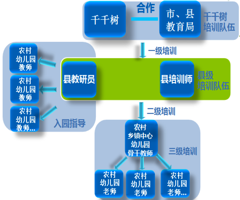
 What Problem Did We Spot?
What Problem Did We Spot?
We have observed rural children facing the long-term consequences of uneven distribution of resources. Of the over 60 million children between the ages of three and six in the country, 57% live in rural areas where their educational needs are inadequately served. In contrast to those living in urban areas, rural children lack quality educational content and materials. Moreover, pre-school teachers not only lack qualified education but also vocational training. That is why rural pre-school teachers often feel powerless, which further compromises the quality of education those rural children received.
A child’s brain development has the most plasticity before the age of six. Thus, the unbalanced distribution of educational resources puts children at a severe disadvantage in terms of cognitive, language and reading skills, leaving them far behind their urban counterparts.
 Our Solution
Our Solution
Since 2011, Leping cooperated with Little Oak Tree to develop teaching which is practical , easy to operate and applicable to rural kindergartens. To this end, we created a three-tiered training system involving local education authorities, county-level trainers and township backbone teachers to ensure rural pre-school teachers are available to effective training and guidance.
In order to cultivate rural children's ability to solve problems and face the future, we began to explore the content of preschool STEAM education and related teacher training services.
 Breaking the Career
Breaking the Career Our primary focus is on frontline teachers in townships and villages, with a special attention to new teachers or "transferred teachers" who came from middle or primary schools responding to a national call to support kindergartens. As a fundamental link to the teachers of pre-school education, these new teachers are faced with the bottlenecks unimaginable to urban teachers: the scarcity of teaching resources and extremely heavy workload, they are inexperienced in leading pre-school children aged between three and six years old. Trapped in this bottleneck, many teachers gradually lost the drive to push through, and their career identity and sense of happiness were also compromised. It even creates a vicious circle, and negatively affect the child’s brain development.
To address the needs of these frontline teachers, on one hand, we developed a Three-Tiered System and Onsite Training (training based on individual kindergartens) method to provide a healthy ecosystem, so to ensure consistent and professional guidance for rural pre-school teachers. On the other hand, we develop curriculums that are localized, practical, and easy to adopt. Teachers experience a rapid improvement in their own abilities, and observe a corresponding improvement in the performance of their students. Gradually, more challenging lessons are introduced, further stimulating intellectual development and bolstering the confidence and satisfaction of teachers.
 A Healthy Training System
A Healthy Training System 
 High Quality and Practical
High Quality and Practical Not long after Thousand Trees was founded, we put together an R&D team to create teaching materials and classroom content tailored to the educational needs of rural, pre-school children. The team possessed an eclectic background, with expertise in a variety of disciplines, including psychology, anthropology, pre-school education, music education and history. Steering the R&D process are the National Three- to Six-Year-Old Child Development Guide, as well as extensive studies and research regarding the psychological development of children. Prior to wide-scale implementation, all ideas and materials from the R&D team are tested at our non-profit kindergarten, the Thousands Trees Children’s Home.
or the past five years, we have developed low-cost, high-quality, easy-to-use teaching materials and classroom activities that support curriculums tailored to rural pre-school children. With reading at the core, the materials integrate language, art, science, mathematics and health, and are augmented with music and action songs.

In the effort to elevate the quality of rural pre-school education in China, we strive for impact that can scale up, and solutions that can systematically solve the problem. Over the past five years, we’ve gained a clearer understanding of the problems faced by China’s rural educators, and realize that we cannot solely depend on one single organizations or a fixed model to overcome the challenge.
Therefore, we will work to achieve the following:
(1) Increase the flexibility and adaptability of the teacher-training system so that it can better cope with new challenges that arise.
(2)Establish cross-sector cooperation and join forces with other parties in an effort to solve complex problems more efficiently.
(3)Utilize the power of Internet, research and develop low-cost, far-reaching training platforms, including online education and long-distance research of education techniques.
(4)Identify and train young people who are quick to learn and full of entrepreneurship, so they can continue the effort to find innovative solutions to China’s social problems.


